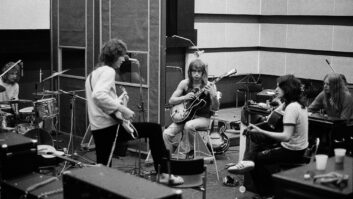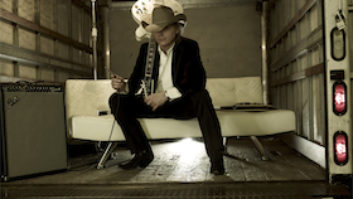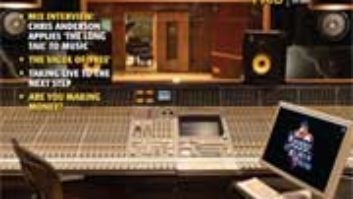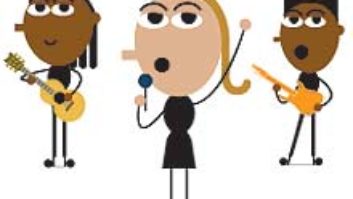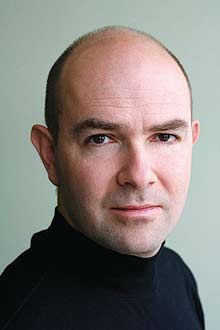
Chris Anderson
Chris Anderson has become famous for coining the term “long tail” to describe a recent economic model in which, even though we live in a culture obsessed with and dominated by the blockbuster movies, music and books that account for around 80 percent of all sales in those categories, there is also big money to be made these days from the staggeringly large number of niche and “failed” products that come out every year. Yes, Walmart has become the largest seller of music and DVDs in the world, but it carries only about 10,000 or fewer CD titles at any given time — just the hits, really, of today and yesterday — because the space they have available in their retail stores is so limited. But Anderson uses the example of such modern businesses as Amazon.com, eBay, Rhapsody and iTunes to show that when the storage of physical items is no longer an issue — for Amazon and eBay because they are aggregators; for Rhapsody and iTunes because their product is digital information — then almost everything, in theory, can potentially be made available for sale, and it turns out there is a market for just about everything, no matter how obscure. A given book or album or song at the long end of the “tail” (in Anderson’s model) might sell only a few copies a year, but when you multiply that by the huge number of titles along the “tail,” it adds up to a significant number.
Anderson first outlined his hypothesis in an October 2004 article in Wired, and expanded upon it in his thought-provoking 2006 best-seller called The Long Tail: Why the Future of Business Is Selling Less of More. In the book, he offers a cogent and detailed analysis of how the tremendous global growth of the Internet and the concomitant rise in digitization of music, movies and books are changing economic assumptions and democratizing both information and commerce. We are no longer limited by the tyranny of the brick-and-mortar sellers, who make their buying choices based on whatever is most popular; now, with a few mouse-clicks, we can hunt down just about anything we want, read multiple, unfiltered opinions about whatever it is online and, in the case of downloads, have it immediately.
And then there is free. Between YouTube, MySpace, media Websites and untold numbers of peer-to-peer music “sharing” sites, there are hundreds of thousands of hours of music and videos available at no cost on the Internet. This has, of course, had a tremendous impact on all media — from the traditional music business to newspapers — and we are just beginning to understand the ramifications of this development. It has spelled doom for many businesses — but will it also be an opportunity for others, just as the “long tail” has been? Chris Anderson is on top of this trend, too: In 2008, he wrote a fascinating cover story for Wired titled “Free! Why $0.00 is the Future of Business,” and that is also becoming a book due for release this summer.
In mid-March, we talked with Anderson about some of the issues in The Long Tail and Free and how they relate to the music business. I wish I could say he had encouraging words for music industry pros, but that is not the case.
If there continues to be a decline in income for both artists and studios because of file sharing and a general devaluation of recorded music — and making records becomes just a loss-leader for bands to make money performing live — what will be the incentive for crafting a great studio album?
That’s a rhetorical question, I presume. Obviously, if the studio album is viewed as a promotional sampler, a taste of what you do musically, which will monetize or not monetize some other way, then obviously you want that taste to be as good as possible.
When I hear that argument, though, I think of Revolver or Sgt. Pepper: Here’s what The Beatles did after they stopped playing live. But in today’s climate, if they couldn’t then go out and play the material live, how would they make money off of it?
I see where you’re going. You know, I’m resistant to try to apply one-size-fits-all models to the music industry. I’m resistant to tell anyone in the music industry what to do. I can’t save the industry.
All I can really do is tell you what’s happening from an economic perspective. I was in bands for most of my 20s; I get this. Your magazine is writing for industry professionals, right? Well, industry professionals are probably like two percent of the people who are in music one way or another. Most people who are in the “music industry” are amateurs; they have day jobs. They do it for fun, for expression, for the sheer joy of it. ‘Twas ever thus.
I’m a “long tail” guy. I don’t care about the head, and I know lots of people do, and as a consumer I like the head, but from an economic perspective I don’t focus on the head. What you’re talking about is mostly the head. There’s more to the industry than that. And I also think that most of the non-hit musicians were failed by the old models. They weren’t signed to labels, they weren’t distributed in the stores, they couldn’t afford the great studios, they weren’t making the epic albums in the first place. What the new system has going for it, of course, is it’s easier to do more of those things yourself so you’re no longer dependent, in quite the same way, on getting that deal and working in a big studio, and there’s certainly not the same stigma associated with being on an independent label — what does that even mean now? — or putting out and marketing an album yourself. So, yes, it’s different, but is it worse? Not for most musicians. They don’t need the old system.
What, if anything, do you take away from the Radiohead experiment of putting out an album and then letting people pay whatever they wanted for it?
I take away that it worked well for Radiohead. I understand that everybody wants to know what the silver bullet is; they want to know the secret formula that works for everybody. There is no secret formula that works for everybody. It’s just like if you asked, “What kind of blog works well?” There is no formula. Every blogger has to figure out their own path, their own way. It’s the same way for bands. It used to be possible that if you were fantastically lucky, you could just let the system handle all the business nonsense — get signed and let the pros do the work. That’s just not the case anymore. Every band has to be their own business manager and create their own marketing and figure out what’s right for them and their audience. I know it’s tiresome. I know it’s not what they signed up for, but it’s the only way. So the Radiohead example would not work with everybody.
I hear that for your new book, Free, you want to allow people to read it for free online. What do you think that will do?
I don’t know exactly. I think it will be a fun experiment. The aim is to maximize its reach. Free lowers the barrier of entry to zero so more people will sample the book one way or another. I believe in the physical book. The difference between books and music is that the physical book is, for many people, still the superior form; especially to read 80,000 or 100,000 or more words. For most people now, though, the CD is the inferior form. They don’t want it in that form; they want it on their iPod, so if they buy a CD, they have to rip it and then they have to transfer it and it’s a hassle. Free works in books terrifically because the free digital form is a sampler for the paid physical form. Free works in music, as well, where the free digital form is marketing for the paid experiential form — the concert. But the downside is that people have to go on tour, which is a hassle. Not everybody can, not everybody wants to, etc. In a sense, free works better for books because every author can use it, whereas free music only really works for touring bands.
Concerts are where we have the least control, as an audience, especially when it comes to pricing. Bands are trying to make up for losses in album revenue by charging more for tickets. So you have all this free stuff on the Internet, which is great, but the concert experience is becoming increasingly available only to an elite.
Yeah, could be. That would be bad. The whole concert world is not there yet. We still haven’t figured out ways to promote concerts properly and we haven’t figured out ways to keep the monopolists out of it. It’s disappointing how unreformed the concert business is. The StubHubs of the world were a huge advance because that added at least some democracy to the process. Before, it wasn’t price that determined if you could go, but could you take the day off work to stand in line or to speed-dial a number? So now with the StubHubs of the world, you can at least pay your way — money can talk. But as you say, it limits who can go to a show, which, of course, is a bad thing.
It seems completely corrupt to me — the way these online companies get tickets before the general public, and then they charge these exorbitant prices. To me, it feels worse than the days when a few scalpers would be outside a venue peddling high-priced tickets.
I can see that. It probably is corrupt. It’s broken. But there are lots of industries that are broken right now. I have confidence that concerts — unlike a broken industry like the CD industry — are still an incredibly important part of the music industry and will probably only grow going forward. There’s nothing wrong with the product; it’s the industry around the product, and what will change that is for people’s buying habits to change — to not pay the high prices, or for bands to figure out other ways to reach more of their fans.
TV, Webcasts, closed-circuit…
All those things. The bands that succeed are going to be the ones that figure out the best way to reach their fans.
The way that songwriters have traditionally been paid is sort of an early version of micropayments, where you get two or three cents from your song being played on the radio. But now you have a world where there are zillions of Internet radio stations competing with terrestrial stations. Coupled with the trend toward not paying for music at all, this has left songwriters as particularly vulnerable.
Well, aren’t Internet radio stations supposed to be paying royalties?
Sure, but my understanding is that many of them don’t, and it’s tough for ASCAP and BMI to police that and regular and satellite radio.
So how can they enforce that they get royalties? I don’t know. My sympathies are mixed on this one. I think the royalty rates are kind of too high for Internet radio. I wish artists could opt-in or opt-out. Everyone who puts music on MySpace for free has pretty much decided that they’d rather give the music away and reach an audience than be paid for it. I wish there was an easy way for them to enable Internet radio stations to distribute their music for free, as well.
This whole conversation has been based on the assumption that musicians want to be paid. Are you sure that’s true? I know some musicians want to be paid. But I think there are a lot of musicians who would really just rather be heard. Being forced to pay for music, whether it’s the Internet station or the consumer, interferes with being heard. I think people should have a choice — do you want to be paid or do you want to be heard? Because it is a choice.
Well, getting heard is a crapshoot in itself.
Absolutely, but your odds of being heard are improved if you lower the barriers to entry.
How can artists learn the ropes of where to go and how to get heard?
Again, it’s like asking how can bloggers learn the ropes. Participate. See what other people do. The idea that you can be an “artist,” isolated around your art — it’s a lovely idea, but it just doesn’t work anymore. Somebody in the band has to be the marketing lead. They have to build the presence, maintain the presence, they have to do community management, they have to do the e-mail list. You’ve got to have a business head. If you want to be a commercial band, then you are entrepreneurs and you’re a startup company, and no one’s going to do it for you; you’ve got to it for yourself.
No Doubt did something fascinating the other day: If you go to one of their concerts, you can get their entire back catalog for free. This is a pretty good incentive to go to one of their concerts.
With so much free stuff out there, has the relative success of iTunes and Rhapsody surprised you?
They’re not selling music as much as they’re selling convenience. It’s a time-money calculus. If you’re young, you’ve got more time than money, so you’re more likely to use peer-to-peer more. If you’re older, you’ve got more money than time and you will pay for convenience. So to me, iTunes and Rhapsody are simple convenience: “I can’t be bothered to track things down on peer-to-peer, and 99 cents here or there, or $14.95 a month is just not meaningful to me compared to my time.”
Is there anything that you said in The Long Tail that has been changed by circumstances of the market since?
Not really, but there were a lot of misunderstandings about The Long Tail, which I attempted to deflect in the book, but which were misunderstood anyway. The first was this notion that I was announcing the death of the blockbuster, which is not true. It’s the death of the monopoly of the blockbuster. The second is sort of my own fault because of the subtitle we put on the book. Fundamentally, The Long Tail is about culture. It’s true that you can build businesses around the long tail [concept], but most people won’t. Most of the long tail’s effect is just cultural diversity and variety, and I think everyone assumed they could make money on the long tail, which is not the case. Only the aggregators really make money in the long tail. You can build an audience in the long tail, you get more choice as a consumer in the long tail, but by and large the long tail is dominated by nonmonetary forces. I wrote it as business book, so it’s my own fault if people read it entirely through a business lens. But it’s a business book because culture books don’t sell. [Laughs]
So is Free a tangent from The Long Tail?
Somewhat. The chain of logic goes like this: Infinite variety — which is what The Long Tail is about — was enabled by unlimited shelf space. Unlimited shelf space is only possible when shelf space costs nothing. Free shelf space created a cultural revolution that we’re all enjoying today. What else can free do? So that’s what the new book is.
How much of all this is generational?
A lot!
I’m a baby boomer. I’ve never downloaded something peer-to-peer. I still love CDs, but I’ve certainly benefited from the long tail of e-commerce. I’ve gotten incredible things from Amazon and other places I thought I’d never find.
It’s not entirely generational, but it’s heavily generational. Basically, everything I do divides readers into two camps. There’s people over a certain age — I’m not sure what that age is; maybe 30 — and they’re like, “No way. This is complete bullshit.” And there are people under 30 who say, “Duh! You wrote a book about that?” My kids can’t believe what an idiot I am for writing a whole book on “free.”
My teenagers haven’t really explored peer-to-peer, which I personally think is to be admired, so they buy from iTunes or, actually, they prefer the sound quality of CDs, as do I. And they’d never listen to music on an iPhone. But then, when I think about this issue historically, we listened on shitty transistor radios, and commercial cassettes were pretty bad.
That’s right. MP3s are worse quality than CDs — I guess. I can’t really hear the difference, to be honest. I suppose that disqualifies me from talking about music because I’m such a cretin. Unfortunately, I’m often listening to music on headphones on airplanes, so I’m not really the guy to be telling the difference between MP3 and WAV. [Laughs]
When you go around the country speaking, do you find that people are desperate for solutions to all this?
I think some people are desperate for solutions. I find the words “music industry” to be really limiting. When they say “music industry,” what they really mean is record labels. And frankly I don’t have an answer for the labels. Maybe they’re going to go away. It happens. But when you look at the rest of the music industry — the artists themselves who are by and large able to get an audience — it’s okay for them. The fans get extraordinary exposure to the diversity in new music. The touring, the licensing, the merchandise — in some ways it’s never been better. For the labels it’s never been worse. I don’t really feel music needs to be fixed. I don’t think there’s anything wrong with it. I think there’s something wrong with the very narrow slice of professional, classic distribution of music.
Blair Jackson is the senior editor of Mix.
